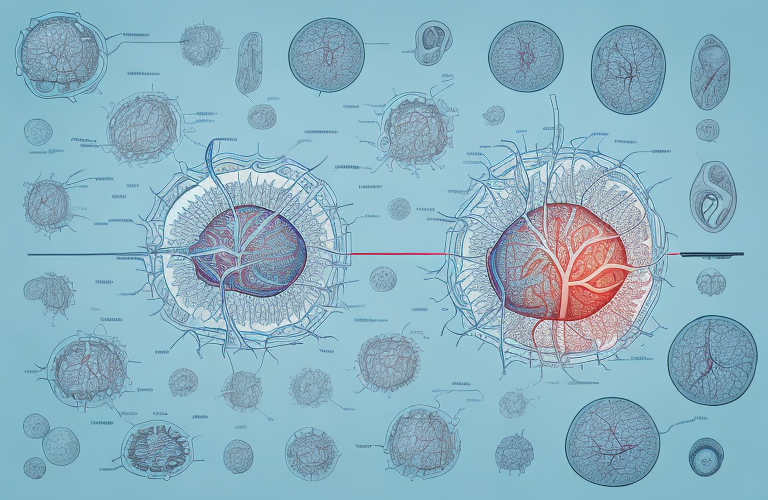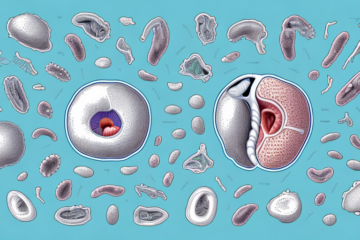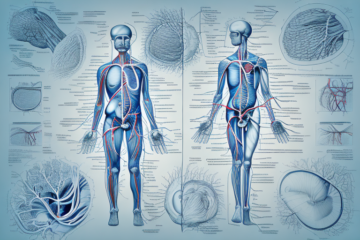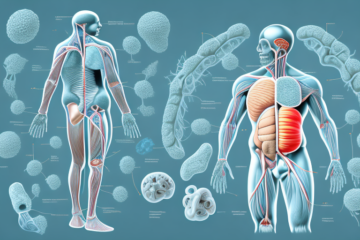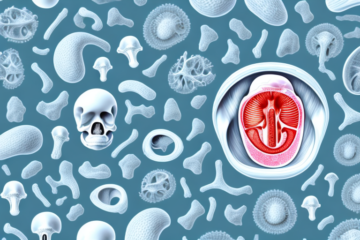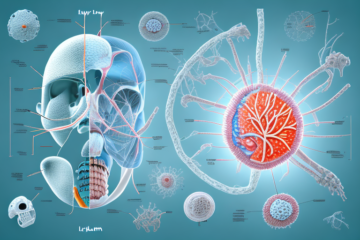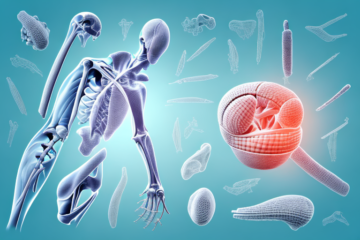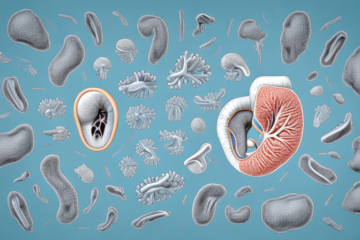The lymphatic system is a complex network of vessels and tissues that plays a crucial role in maintaining our overall health and well-being. The lymphatic vessels, which are part of this system, are responsible for transporting lymph, a fluid that contains white blood cells and other important immune system cells, throughout the body. Understanding the function and anatomy of the lymphatic vessel can help us better understand the importance of maintaining a healthy lymphatic system.
Understanding the Lymphatic System
The lymphatic system is a network of vessels and tissues that works to maintain the balance of fluids in the body. This system is responsible for transporting lymph, a clear fluid that contains white blood cells and other immune system cells, throughout the body. The lymphatic vessels are the main channels through which lymph flows, and they play a key role in the immune system’s response to infections and other threats.
In addition to its role in maintaining fluid balance and immune response, the lymphatic system also plays a crucial role in the absorption of fats and fat-soluble vitamins from the digestive system. The lymphatic vessels in the small intestine, called lacteals, absorb these nutrients and transport them to the bloodstream.
Disorders of the lymphatic system can lead to a variety of health problems, including lymphedema, a condition in which excess fluid accumulates in tissues and causes swelling. Other conditions that can affect the lymphatic system include lymphoma, a type of cancer that affects lymphocytes, and lymphangitis, an infection of the lymphatic vessels.
Anatomy of the Lymphatic Vessel
The lymphatic vessels are similar in structure to the blood vessels in our body. They are made up of a series of tubes that are lined with endothelial cells, which are cells that help regulate fluid flow. The lymphatic vessels also contain smooth muscle cells, which help to move lymph through the vessels.
In addition to their structural similarities to blood vessels, lymphatic vessels also play a crucial role in our immune system. Lymphatic vessels transport lymph, a clear fluid that contains white blood cells, throughout the body. These white blood cells help to fight off infections and diseases. Without the lymphatic system, our body’s ability to fight off infections would be severely compromised.
The Role of the Lymphatic Vessel in Immune System Function
The lymphatic vessel plays a crucial role in the function of our immune system. The lymphatic vessels transport lymph, which contains white blood cells and other immune system cells, throughout the body. These cells help to detect and fight infections, viruses, and other harmful substances that may enter our body.
In addition to its role in immune system function, the lymphatic vessel also plays a key role in maintaining fluid balance in the body. The lymphatic system helps to remove excess fluid and waste products from tissues and return them to the bloodstream. This process helps to prevent swelling and edema in the body, and ensures that our tissues receive the nutrients and oxygen they need to function properly.
How Lymphatic Vessels Help to Remove Waste and Toxins from the Body
The lymphatic vessels also play a crucial role in removing waste and toxins from our body. As lymph flows through the lymphatic vessels, it picks up waste and other substances from our cells and tissues. The lymphatic vessels then transport these substances to the lymph nodes, where they are filtered out and destroyed by our immune system cells.
In addition to removing waste and toxins, the lymphatic system also helps to maintain fluid balance in the body. When excess fluid builds up in the tissues, the lymphatic vessels absorb it and transport it back into the bloodstream. This helps to prevent swelling and edema in the body.
The Importance of Lymphatic Drainage for Overall Health
The lymphatic system relies on a process called lymphatic drainage to function properly. Lymphatic drainage is the process by which lymph is moved from the lymphatic vessels into the lymph nodes. This process is crucial for maintaining the proper flow of lymph and ensuring that waste and toxins are properly filtered out of our body.
When the lymphatic system is not functioning properly, it can lead to a buildup of toxins and waste in the body, which can cause a range of health issues. These issues can include swelling, inflammation, and even infections. Lymphatic drainage can help to prevent these issues by promoting the proper flow of lymph and ensuring that waste and toxins are removed from the body efficiently.
Common Conditions Affecting Lymphatic Vessels and How to Prevent Them
There are many conditions that can affect the lymphatic vessels and impair their function. These conditions include lymphedema, which is a condition in which the lymphatic vessels become blocked or damaged, and lymphoma, which is a type of cancer that affects the lymphatic system.
To prevent these conditions, it is important to maintain a healthy lifestyle and practice good hygiene. Regular exercise, proper nutrition, and avoiding exposure to harmful substances can help to keep the lymphatic system functioning properly.
In addition to these conditions, there are other factors that can contribute to lymphatic vessel dysfunction. These include obesity, chronic inflammation, and certain medications. Obesity can put extra pressure on the lymphatic vessels, making it harder for them to function properly. Chronic inflammation can also damage the vessels over time. Certain medications, such as those used to treat cancer or autoimmune diseases, can also affect the lymphatic system.
It is important to be aware of these risk factors and take steps to minimize their impact. Maintaining a healthy weight, managing chronic inflammation through diet and lifestyle changes, and discussing potential side effects of medications with your healthcare provider can all help to protect the health of your lymphatic system.
Diagnosing and Treating Lymphatic System Disorders
If you suspect that you may have a disorder affecting the lymphatic system, it is important to seek medical attention from a trained healthcare professional. Diagnosing and treating lymphatic system disorders can be complex, and it is important to get an accurate diagnosis and appropriate treatment.
Some common symptoms of lymphatic system disorders include swelling, pain, and tenderness in the lymph nodes, fatigue, and unexplained weight loss. Your healthcare provider may perform a physical exam, blood tests, imaging tests, or a biopsy to diagnose a lymphatic system disorder. Treatment options may include medication, surgery, or lifestyle changes such as exercise and a healthy diet. It is important to follow your healthcare provider’s instructions and attend all follow-up appointments to ensure the best possible outcome.
The Connection Between the Lymphatic System and Cancer
Research has shown that there is a strong connection between the lymphatic system and cancer. Lymphoma is a type of cancer that affects the lymphatic system, and many other types of cancer can spread to the lymphatic system through a process called metastasis.
If you have been diagnosed with cancer, it is important to work closely with your healthcare team to monitor the health of your lymphatic system and take steps to prevent the spread of cancer to the lymphatic vessels.
One way to prevent the spread of cancer to the lymphatic system is through early detection and treatment of cancer. This can involve regular screenings and imaging tests to monitor the progression of the disease and catch any signs of metastasis early on.
In addition, maintaining a healthy lifestyle can also help to support the health of the lymphatic system and reduce the risk of cancer. This can include eating a balanced diet, getting regular exercise, and avoiding smoking and excessive alcohol consumption.
Holistic Approaches to Supporting the Health of Your Lymphatic Vessel
There are a number of holistic approaches that can be used to support the health of the lymphatic system. These may include massage therapy, acupuncture, and herbal remedies. It is important to work with a trained healthcare professional when exploring these types of treatments.
In addition to these approaches, regular exercise can also help to support the health of the lymphatic system. Exercise helps to increase blood flow and circulation, which can aid in the removal of waste and toxins from the body. It is recommended to engage in at least 30 minutes of moderate exercise per day.
Diet can also play a role in supporting the health of the lymphatic system. Eating a diet rich in fruits, vegetables, and whole grains can provide the body with essential nutrients and antioxidants that can help to reduce inflammation and support immune function. It is also important to stay hydrated by drinking plenty of water throughout the day.
Exercises and Techniques for Improving Lymph Flow
Regular exercise and movement can help to improve the flow of lymph through your body. Activities such as walking, swimming, and yoga can help to stimulate the lymphatic vessels and prevent lymph from becoming stagnant.
In addition to exercise, there are several techniques that can be used to improve lymph flow. One such technique is dry brushing, which involves using a dry brush to gently massage the skin in circular motions, starting at the feet and working upwards towards the heart. This can help to stimulate lymphatic flow and improve circulation.
Another technique that can be used to improve lymph flow is lymphatic drainage massage. This type of massage involves gentle, rhythmic movements that help to stimulate the lymphatic system and encourage the flow of lymph. It can be particularly beneficial for individuals with lymphedema or other conditions that affect lymph flow.
Nutrition Tips for Boosting Your Immune System and Supporting Your Lymphatic Vessel
A balanced and healthy diet can help to support the function of your immune system and your lymphatic vessel. Eating a diet that is rich in fruits, vegetables, lean protein, and whole grains can help to provide your body with the nutrients it needs to maintain a healthy lymphatic system.
In addition to a healthy diet, staying hydrated is also important for supporting your lymphatic system. Drinking plenty of water and other fluids can help to flush toxins out of your body and keep your lymphatic system functioning properly. Additionally, regular exercise can also help to support your lymphatic system by improving circulation and promoting lymphatic drainage.
How Massage Therapy Can Benefit Your Lymphatic System
Massage therapy can be a beneficial treatment for people with lymphatic system disorders. Massage can help to stimulate the lymphatic vessels and promote lymphatic drainage, helping to reduce swelling and improve overall lymphatic function.
In addition to its benefits for people with lymphatic system disorders, massage therapy can also be helpful for athletes and individuals who engage in regular physical activity. Massage can help to reduce muscle soreness and inflammation, which can improve recovery time and overall athletic performance. Additionally, massage can help to increase flexibility and range of motion, which can help to prevent injuries and improve overall physical function.
Promising Research on New Treatments for Lymphedema and Other Disorders
There is ongoing research into new treatments for lymphatic system disorders such as lymphedema. Some of these treatments may include new surgical techniques, medications, or specialized therapies. If you are interested in exploring these options, it is important to work with a trained healthcare professional.
One promising area of research for lymphedema treatment is the use of stem cells. Studies have shown that stem cells can help repair damaged lymphatic vessels and improve lymphatic function. However, more research is needed to determine the safety and effectiveness of this treatment. Additionally, researchers are also exploring the use of compression garments and exercise programs to manage lymphedema symptoms and improve quality of life for patients.
Tips for Maintaining a Healthy, Active Lifestyle with a Compromised or Weakened Lymphatic Vessel
If you have a compromised or weakened lymphatic vessel, it is important to take steps to maintain a healthy and active lifestyle. This may include taking frequent breaks throughout the day to move your body, getting regular exercise, and eating a healthy diet.
It is also important to work closely with your healthcare team to manage any underlying health conditions or treatments that may be affecting your lymphatic vessel.
In conclusion, the lymphatic vessel plays a vital role in maintaining our overall health and well-being. Understanding the function and anatomy of the lymphatic vessel can help us better understand how to maintain a healthy lymphatic system, prevent disease, and manage any conditions that may affect the lymphatic vessels.
Another important aspect of maintaining a healthy lymphatic system is to stay hydrated. Drinking plenty of water throughout the day can help flush out toxins and waste products from the body, which can help reduce the workload on the lymphatic system.
In addition, practicing stress-reducing techniques such as meditation, yoga, or deep breathing exercises can also be beneficial for the lymphatic system. Stress can have a negative impact on the immune system, which can in turn affect the lymphatic system.

